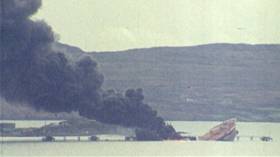Displaying items by tag: Betelgeuse disaster
Families of Whiddy Island Betelgeuse Victims Seek State Apology in New RTE Doc on One
Relatives of the 50 people who died in the Whiddy island Betelegeuse tanker explosion 42 years ago are seeking an apology from the Government for “appalling failures “
The call has been made in a new RTE Documentary on One programme on the disaster in Bantry Bay, West Cork, which is due to be broadcast this weekend.
International maritime lawyer Michael Kingston said his father, Tim, was one of 50 people who died in “atrocious circumstances” where “no rescue took place” due to “catastrophic safety failures” in the early hours of January 8th, 1979.
Interviewed on RTE Radio 1’s Morning Ireland, Kingston said his father was “determined to have died by accidental drowning”, when “in fact he died because of unlawful breaches of regulation”.
He said that families had never received a State apology for the "appalling regulatory failures".
 The Betelgeuse, broken in two leaving 50 Irish, British and French citizens dead
The Betelgeuse, broken in two leaving 50 Irish, British and French citizens dead
He said the families appeal in the documentary for the Government to "show decency and....issue that apology for the appalling failures in administration of justice and failure to implement regulation".
Kingston, who is vice president of the French Irish Association of the relatives and friends of the Betelguese, said families of the French, Irish and British victims who died that night have had to live with the fallout, with "no resolution".
The Documentary on One by Michael Lawless and Donal O’Herlihy includes an interview with former president Mary McAleese, who was working as an RTÉ reporter at the time, and fireman Brendan O’Donoghue who has never previously spoken about the fire.
It is due to be broadcast on Saturday, October 2nd at 2 pm and Sunday, October 3rd at 6 pm on RTE Radio 1 here
Betelgeuse Disaster: 40th Anniversary Memorial Service
#Coastal - People in their hundreds have attended a memorial service in Bantry, west Cork, to mark the 40th anniversary of the Whiddy Oil disaster in which 50 people died.
As RTE reports, the French-owned oil tanker the Betelgeuse caught fire and exploded as it was unloading crude oil at Whiddy Island in Bantry Bay in the early hours of 8 January 1979.
A lone piper led the Irish and French relatives past dozens of floral wreaths - among them flowers from oil companies Total and Chevron - into St Finbarr's Church today where the names of the deceased were read out.
The victims - 42 French, seven Irish and one English - were remembered during a bilingual service conducted by Bishop of Cork and Ross Dr John Buckley.
For more on the disaster which took place four decades ago, click here.






























































